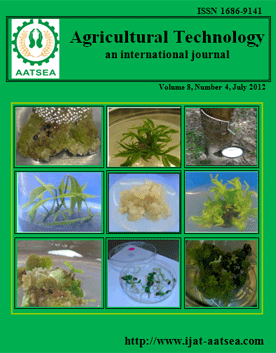ThaiScience
ThaiScience
INTERNATIONAL JOURNAL OF AGRICULTURAL TECHNOLOGY
Volume 15, No. 02, Month MARCH, Year 2019, Pages 207 - 214
The application of tannin extract from plants to reduce the concentration of arsenic
Aroonsrimorakot, S. and Whangchai, N.
Abstract Download PDF
This research prepared the tannins extract from agricultural wastes i.e. rice straw, tea leaves, longan leaves and banana leaves with fresh water for 2 months. The highest concentration of tannin was banana leaves (6,464.98 mg/L) followed by longan leaves (4,478.99 mg/L), rice straw (4,000.00 mg/L) and tea leaves (1,397.95 mg/L) respectively. Tannins extract were used for arsenic treatment in synthetic waste water. The result showed the efficiency of arsenic removal by 10, 20, 30, 40 and 50 mg/L of tannins concentration from banana leaves were 50.82%, 52.54%, 54.56%, 58.42% and 51.01% respectively, tea leaves were 69.74%, 73.42%, 60.29%, 63.60% and 70.54% respectively, longan leaves were 61.03%, 56.07%, 54.36%, 40.01% and 51.80% respectively and rice straw were 53.68%, 46.70%, 55.23%, 49.22% and 54.11% respectively which indicated that there were not significantly differed to arsenic reducing. In addition, increasing of pH in solution from 2.5 to 5.5, 6.5, 7.5 and 8.5 led to decrease of arsenic removal efficiency.
Keywords
Tannin extract, Agricultural wastes, ArsenicINTERNATIONAL JOURNAL OF AGRICULTURAL TECHNOLOGY
Published by : Association of Agricultural Technology in Southeast Asia (AATSEA)
Contributions welcome at : http://www.ijat-aatsea.com
